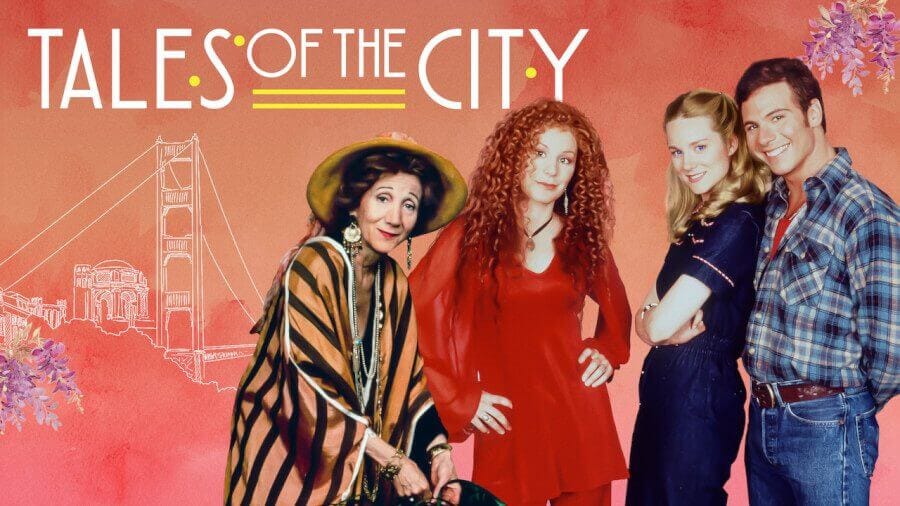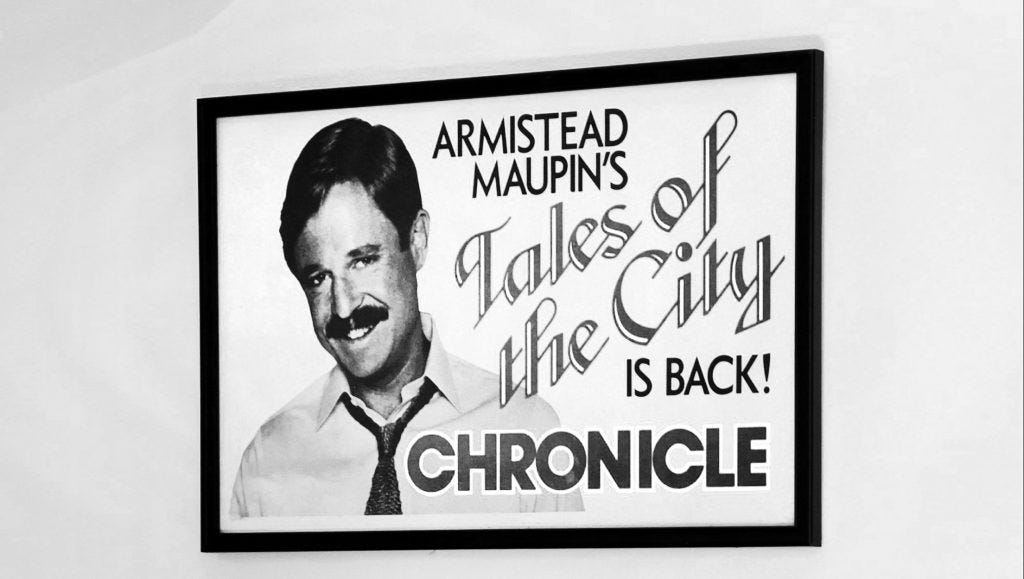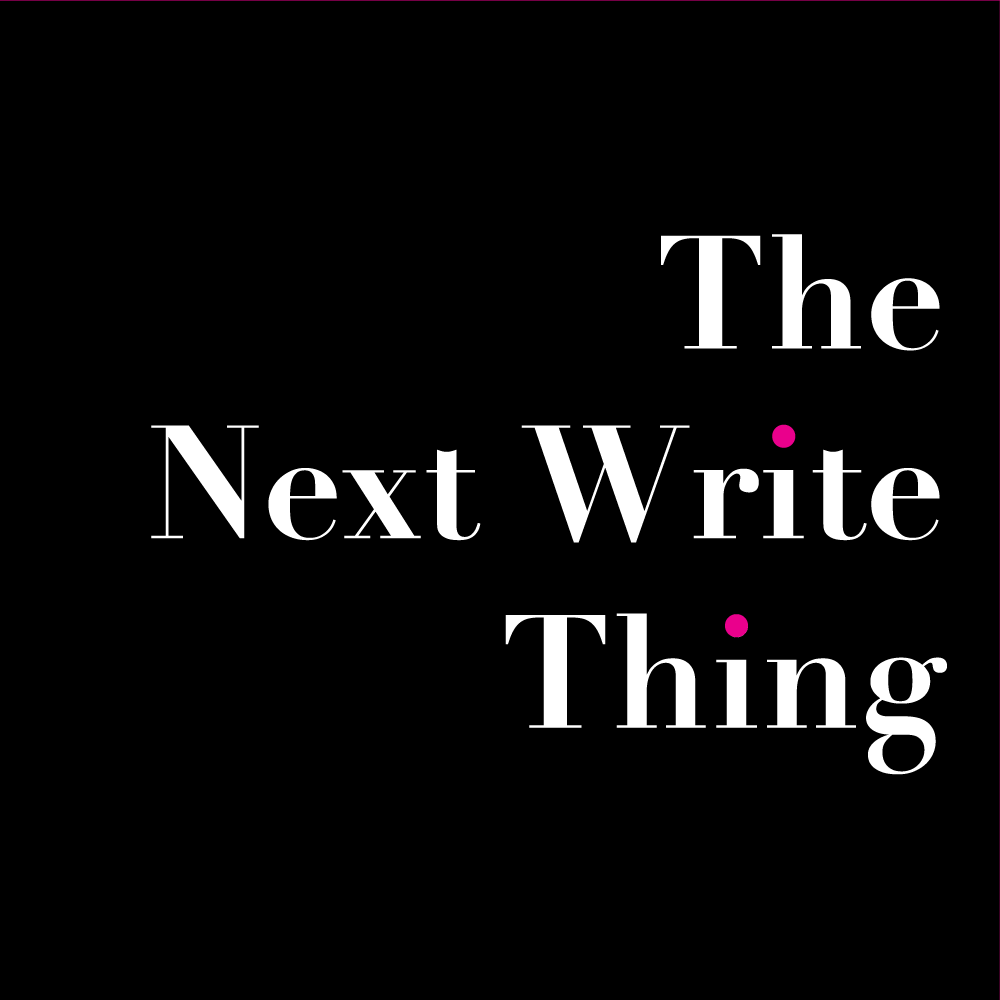Why I ❤️ Armistead Maupin's "Tales of the City"
The Books We ❤️ Club welcomes Nan Tepper of The Next Write Thing and Style Your Stack
Just a reminder: the Lamb Wrap Party is on Saturday, Nov 9th at 4pm Eastern - RSVP here.
I’m still a little bit agog that Armistead Maupin got his start by serializing Tales of the City in the San Francisco Chronicle (there’s hope for us yet, Substack serializers!)
And I still remember what a to-do the premier of Tales of the City was in January 1994 on PBS—it was produced by the UK’s Channel 4, everyone said, because it was too hot to handle for American puritanism. Not that there was that much sex actually involved; I mean, yes there’s a straight swingers club and a brief gay bath house scene. And who can forget Mouse’s performance in the underwear dance contest at the End Up?
Of course, they said the really Big Deal was Anna Madrigal’s secret, but what I remember is her invocation of Atlantis.

Don’t you know what dominated the skyline of Atlantis, Edgar … the thing that loomed over everything? … A pyramid! An enormous pyramid with a beacon burning at the top!
It was magical, and we were magical by association, us baby queers living in our first apartment with our first gay roommates in the New Atlantis—San Francisco in the 90s—sitting around watching Tales of the City and falling in love with ourselves.
I am delighted to present Nan Tepper’s article “A Tale of Two Teppers” for The Books We ❤️ Club—the book club you don’t actually have to read the book, leave the house, or even change out of your jammies to enjoy—as writers sing the praises of books that reach into our hearts.
We invite you to add your own reactions, insights, and ideas about Tales of the City in the Comments for an impromptu book club session. Share your favorite quotes, characters, moments, and surprises in discussion with other passionate readers.
(And if you’d like to feature your favorite book in a future edition, DM me.)
The next edition of The Books We ❤️ Club will feature
and his selection of Gene Wolfe’s The Book of the New Sun.A Tale of Two Teppers
by
of andThank you, Anna Madrigal for offering us a seat at your table.
As a kid and an adult, my father and I shared a love of reading. He was always interested in whatever my latest favorite book, essay, or Mad Magazine feature was, and he’d read them with very few exceptions. It was a bond that we had with each other and no one else.
Not only did he read my favorites, I read his, as well. Sometimes, especially when I was 11, 12, 13, I’d help myself to the new hardcovers lined up—alphabetized by author—in the built-in bookcases in his den. Of course, I only grabbed his books after he’d read them. That was the rule. The den was his place of solitude and calm, except when he was paying the monthly bills and it got a little stressful in there so I kept my distance. There was always music playing. He loved opera and classical, but there were many days when blasting Barbra Streisand, Donna Summer, or the latest Sondheim musical took priority on his turntable.
A word of advice to parents, though I’m loathe to censor books: I don’t recommend giving an 11-year-old a copy of Portnoy’s Complaint. It could fuck them up for years. My dad didn’t know I’d “borrowed” that book. Please don’t ask about me about liver. I was way too young to read that part. I probably still am!
He enjoyed literature, thrillers, vampires, and slightly trashy beach reads (think Harold Robbins). He also liked gay novels, though there weren’t that many in the early 1970s. Especially not many that imbued a sense of self-esteem if one was queer. And he wasn’t out yet, so he needed to be discreet about his love for and desire of that genre.
Yup. Dad was gay. He came out in 1977 when I was 16 and life changed drastically for my whole family. I came out around the same time. A double whammy for my mom. My parents divorced, my dad relocated with his books and his record albums. There were feelings of anger, guilt, and loss. For my dad, there also was a sense of relief for telling the truth about who he was. Maybe my mom shared the relief … to have what was hidden finally revealed.
He broke my heart when he moved out of our house because he didn’t take me with him. I stayed with my mom and my brother and saw Dad on Tuesday nights and weekends. We didn’t stop sharing books, though. I got my hands on copies of Rubyfruit Jungle and Patience and Sarah when I was in high school. I wanted to be seen, I wanted company in my lonely queer teenage world of one. I devoured those books, returning to them over and over because they gave me hope for finding love in a world that wasn’t yet up to handling queerness with much grace.
My dad read them, too. He loved Rubyfruit Jungle, because who doesn’t love Molly Bolt? He was meh about Patience & Sarah, probably because it was way too tame—I found that frustrating as well—but at the time it was soothing because I was so hungry for affirmation. He was happy there were books for me that validated my feelings and desires.
The only other queer book I remember on his shelf was The Front Runner. And there was Isherwood, Capote, Forster, and Wilde. I wasn’t in the know enough to understand their importance. Later, he became obsessed with Anne Rice’s Vampire Chronicles, and I jumped on board; as each book was published, it was added to our read-as-soon-as-possible list.
But in 1978, a new writer made his grand entrance with the first Tales of the City book. Yes, Armistead Maupin had arrived. Dad found out about the first book, devoured it and lent it to me right away. I ate it up and re-read the first two many times until there was a third, and a fourth...
I felt normalized by that series. I felt embraced. The books were delightful, kind, and inclusive. Unapologetic. They were funny and brave. They made me feel like I belonged. They weren’t dark or depressing in the way that some older queer books were. So much self-loathing. Think The Well of Loneliness or The Children’s Hour. Couldn’t get any bleaker than those. And yet some small part of me loved both, because at least there was representation, no matter how tragic. We settled for so little in those years. The world was changing, and new books were being published that represented a world—or a corner of the world—that felt safe and loving. It felt like a miracle to me.
This was the late 70s, that time just before AIDS/HIV had really taken hold of the queer community. Gay liberation was on the rise, and those of us who lived in cities, especially, began to experience an outness, a sense of freedom that was new and exciting.
Maupin’s books represented this emerging world. His books weren’t literary masterpieces. They were romps for the most part, silly, fun, light reading that entertained. Even though not terribly complex, I think they offered accessible, engaging writing that the general public (read as “straight”) could and did enjoy. It felt like he was giving us a way to enter the mainstream, if we wanted membership in that club.
For those of you who’ve never read the series because they weren’t on your radar—or goddess give me strength—you were born after 1978, there are 10 volumes in all, and I must admit they do get a smidge tired as the series goes on. The first few books, though? Revelatory, celebratory, and mandatory reading!
Maupin made an enormous contribution to queer culture. He stripped away ugly generalizations. He wrote books that were thoughtful. He gift-wrapped them beautifully in a form that worked. He told sweet stories about good people––all kinds of people. People who were looking for family, community, love, and fulfilling lives. Straight, queer, trans. Disappointingly, the books weren’t racially diverse, he missed the boat on that one. He wrote about topics that were still considered risqué for most of the American population. Maupin demystified queer “lifestyles”—I hate that word—to reveal that queer folx want the same things as everyone else. Oooh. Surprise!
He created Anna Madrigal a central character, who was the pot-smoking landlady of 28 Barbary Lane, San Francisco. A mother to all who crossed her threshold, she was mysterious from the start. Her secret isn’t revealed until the ninth book in the series, published in 2014. Maupin not so subtly placed a trans woman in full view of an audience that wasn’t at all conversant about that part of queer culture.
And, I read in a review that Babycakes, published in 1984, was the first work of fiction to acknowledge the arrival of AIDS. I’m not sure if that’s wholly true, but there certainly wasn’t a lot out there at the time.
“Maupin wrote about LGBTQ and inclusion issues decades before the mainstream caught up, but his approach was so accessible it almost felt mainstream.”
– Ross Ruediger/“Vulture”
In 1993, a mini-series starring Laura Linney as Mary Ann Singleton and Olympia Dukakis as Anna Madrigal aired on PBS. Dad and I made a date to be together that first night, as excited about the show as we’d get when the Tony or Oscars would air. There was no bingeing one episode after another back then. We took it a week at a time, and when we weren’t together to watch, we’d call each other and stay on the phone for the entire episode, listening to each other breathe, snack, and laugh—Dad in NYC, and me, in upstate New York.
My dad is gone now; he died in 2011. I cherish the connection we shared. He gave me an appreciation for the arts. A love of books, theater, camp, and high style. But the thing I value the most is that because of the queerness we had in common, he offered me a haven so I could be myself. I provided that for him as well.
Dad had a bit of a fanboy/lust thing for Maupin. But that’s a story for another time.













This was wonderful to read. It was also wonderful to have the TOTC series when it came out as many of us also came out. Loved the books and the weekly show (which I finally saw years later when a friend gave me tapes of it.) Thank you, Armistead Maupin, for this gift. Thank you, Nan Tepper, for the lovely article!
I’d never heard of this series! And hearing about the bond (and haven) Nan and her father shared through these stories makes me want to run to the library right now. Thank you for this lovely piece.